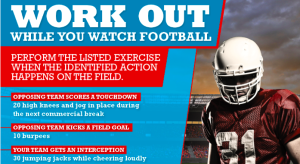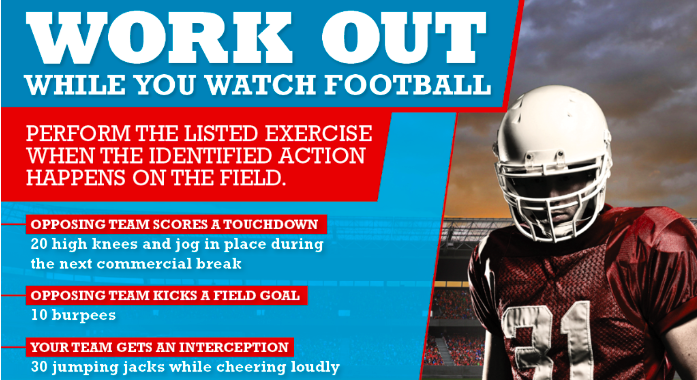Transparency is extremely important to us, so we are letting you know that we may receive a commission on some of links you click on from this page. See our disclaimer.
 This post from Cathy Kenworthy, Interactive Health CEO, was originally published in LinkedIn here. Please visit the original piece to leave any comment.
This post from Cathy Kenworthy, Interactive Health CEO, was originally published in LinkedIn here. Please visit the original piece to leave any comment.
Is there any worksite where health management matters more than in the NFL? All of us football fans are now solidly into the prime of the season; I love the American Heart Association’s graphic on how we can be fit football fans and not couch potatoes!
As week 6 approaches, it’s clear that some teams are healthy and some teams are beset by injuries. How might NFL teams use data to be more competitive… specifically to be predictive about player health and therefore player performance?
I am fascinated by a sparse few articles, published by ESPN back in 2014 and again earlier this year, covering sports teams that are using GPS technology to identify and act upon risks to health – player fatigue in this case – as they occur. Apparently use of GPS technology is a mainstream sports management practice in Australia. According to an August 2015 ESPN article, three NFL teams are now actively using this approach: the Panthers, the Bengals and the Chiefs. The win-loss record of those teams so far this season? 4-0; 5-0; and 1-4. Two out of three teams are perfect so far this season.
Through this technology, key player stats are monitored at practice, including total distance, high-speed running, speeds achieved, accelerations and decelerations, heart rate including time spent at threshold, step balance (which indicates potential injury), and dynamic stress load. Says one NFL trainer, “It can be pretty obvious when you look at the data display. You look at it and say, this is a four-week injury waiting to happen, and really it is completely preventable.”
Says a sports scientist (by the way, who knew there was such a job title?), “These are elite, high-performance competitors. You wouldn't drive a Formula One car without a dashboard of its performance information. We look at players the same way.”
Interestingly, even though the data is both intuitive and compelling about the reduction to injuries among teams that use these technologies, ESPN’s coverage discusses some of the cultural challenges within the NFL to foster acceptance. Do coaches know best? Do players know best? Can players possibly be objective about their health in the heat of high stakes competition?
When I think of employee wellness and the effectiveness of prevention, I see that business competitiveness is inextricably linked to the performance of people, supported by process and systems. What is our ambition to perform? Each of us has the potential to operate at peak performance, and health is an essential ingredient, even for those of us that are not suiting up for the gridiron each week. Empowerment comes from understanding our personalized health “dashboard” … using data to act objectively and preventively to keep us operating at, or close to, our peak potential.





0 Comments